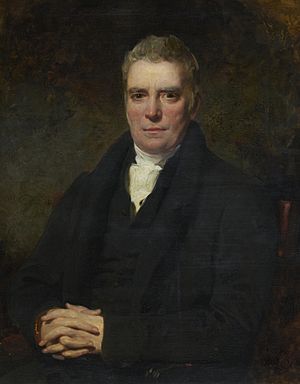Thomas M'Crie the Elder facts for kids
Quick facts for kids
Thomas McCrie
|
|
|---|---|
 |
|
| Born | November 1772 |
| Died | 5 August 1835 (aged 62) |
| Nationality | Scottish |
| Education | University of Edinburgh |
| Occupation | Pastor, Theologian |
| Theological work | |
| Tradition or movement | (1) Anti-Burgher (2) Auld Light (3) United Original Secession Church |
| Main interests | Ecclesiology, Church History |
Thomas M'Crie (born November 1772, died 5 August 1835) was an important Scottish writer, preacher, and historian. He was born in Duns and studied at the University of Edinburgh. He became a leading minister in a church group called the Original Secession Church. M'Crie is best known for his books about famous Scottish reformers like John Knox and Andrew Melville. He also wrote about the Reformation in Italy and Spain.
Contents
Early Life and Learning
Thomas M'Crie was born in November 1772 in Duns, Scotland. His father was a linen weaver. Young Thomas first went to the local school. After that, he became a teacher in nearby schools.
In 1788, he started studying at the University of Edinburgh. He didn't get a degree there, but he continued his education. In 1791, he became a teacher at a school in Brechin. He also studied to become a minister under Archibald Bruce. In 1795, he was approved to preach. A year later, in 1796, he became a minister in Edinburgh.
A Historian of the Church
Thomas M'Crie became very interested in the history of the Scottish church. He wanted to understand how it connected with Scotland's national life. He also studied how it related to the wider development of Protestant ideas.
His first major book was a biography of John Knox, finished in 1811. Knox was a key figure in the Scottish Reformation. M'Crie's book helped people see Knox in a new, more positive way. It was a very important work in church history.
In 1819, M'Crie published another biography, this time about Andrew Melville. Melville was a leader who followed Knox in the Scottish Reformation. M'Crie also explored new topics by writing histories of the Reformation in Italy (1827) and Spain (1829). He was praised for being fair in his writing, even when discussing ideas different from his own.
Teaching and Writing
In 1813, the University of Edinburgh gave M'Crie an honorary Doctor of Divinity (D.D.) degree. This was a special honor, as he was the first minister from his church group to receive it.
After his teacher, Archibald Bruce, passed away in 1816, M'Crie took over his role. He taught theology until 1818. During this time, he also wrote a strong review of Sir Walter Scott's book Old Mortality. M'Crie showed that he knew more about the history of the Covenanters than the famous novelist. He also wrote many other biographies and reviews, mostly about Scottish figures.
His Passing
Thomas M'Crie died in Edinburgh on 5 August 1835. He was buried on 12 August in Greyfriars' churchyard. Even leaders from the main Church of Scotland attended his funeral. This showed how respected he was.
Church Groups He Joined
Thomas M'Crie's journey shows the history of different church groups in Scotland.
- In 1796, he became a minister in the Anti-Burgher Secession Synod.
- In 1806, he and others left this group to form the "Constitutional Associate Presbytery." They were known as the 'Old Lights'.
- In 1827, his group joined with another group to form the "Associate Synod of Original Seceders." This group is also known as the Original Secession Church. M'Crie remained a minister in this church until he died in 1835.
His Family Life
Thomas M'Crie was married twice. In 1796, he married Janet Dickson. They had five children together:
- Thomas M'Crie (who also became a famous writer)
- William, who was a merchant
- Jessie, who married Archibald Meikle
- John
- George, who became a minister
In 1827, after Janet passed away, he married Mary Chalmers. She outlived him and received a pension from the government. This was given because of her husband's important contributions to literature.
Some of His Books
Thomas M'Crie wrote many important books and articles. Some of his most well-known works include:
- Life of John Knox (1813)
- Life of Andrew Melville (1819)
- History of the Progress and Suppression of the Reformation in Italy (1827)
- History of the Progress and Suppression of the Reformation in Spain (1829)
He also wrote about other figures like Patrick Hamilton and Alexander Henderson. Many of his articles first appeared in a magazine called the Christian Magazine.
 | Janet Taylor Pickett |
 | Synthia Saint James |
 | Howardena Pindell |
 | Faith Ringgold |

